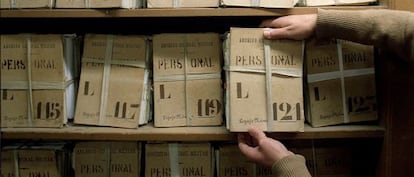Hermetically sealed archives
Historians want access to files in the Foreign and Defense Ministries The former's papers are off-limits while the latter has 10,000 secret reports


Historians are a meticulous crowd. Unmoved by the sense of urgency that drives current affairs, they are accustomed to searching for as long as it takes to find that piece of information that either confirms or invalidates their hypothesis. But that doesn't mean that their patience has no limits.
Foreign Minister Jos¨¦ Manuel Garc¨ªa-Margallo has yet to fulfill his promise to review a cabinet decision from October 15, 2010 that turned nearly all diplomatic notes and cables into classified material, regardless of their date. Besides this, the Foreign Ministry's archive has been closed for a year, following a surprise announcement that the documents were going to be transferred to the National Historical Archive and to the General Archive of the Administration.
This move has left a great many doctoral dissertations and scholarly projects up in the air, and nobody can say when exactly the material will be available to researchers again.
Meanwhile, one of the first things that Defense Minister Pedro Moren¨¦s did when he took up his post was to eliminate his Socialist predecessor's project to declassify 10,000 military documents that are over 40 years old.
Denial of access to archives has "damaged" Spain's image abroad
All of these apparently unrelated measures, derived from the budget cuts, have brought historical research in Spain to an unprecedented halt.
The situation, which would be unthinkable in other European countries, means that scholars are being deprived of the raw materials which are indispensable to their work.
Weary of waiting for a solution that just won't come, nearly 300 historians heeded the call of H-SPAIN, an academic debate forum on Spanish contemporary history, and have turned to the government and the opposition to demand "the immediate reopening of the holdings and guaranteed access to them for all researchers in the shortest possible timeframe."
Support has poured in from all over the world. The petition has been signed by 142 professors and researchers from universities across Spain, as well as 18 from the US, 15 from Britain, 10 from France, seven from Germany, six from Italy, and 13 more from Ireland, Belgium, Portugal, The Netherlands, Hungary, Norway, Canada, Japan, Argentina, Puerto Rico and New Zealand. Another 41 independent researchers and archivists added their names to the list.
Besides prestigious historians such as Jean-Marc Delauny, ?ngel Vi?as, Helen Graham, Alfonso Botti and Borja de Riquer, the writer and former National Library director Rosa Reg¨¤s also backed the demand, as did diplomats such as Carlos Miranda, a former Spanish ambassador to NATO.
"There can be no real democracy in a place where citizens are not guaranteed the right to generate a critical vision of their own historical development based on access to common documentary heritage," warns the letter, which mentions "the deep sense of unease among historians, archivists, journalists and other social groups over the indefinite and unjustifiable end of access to historical documents."
The letter also described as "implausible" the government's arguments to justify its refusal to declassify the military material, and as "arbitrary" the move to classify diplomatic cables which, until last year, could be consulted "without any particular problems by historians from all over the world."
Besides the "enormous damage to countless historical research projects both in Spain and abroad," the petitioners also talk about "the damage to the country's image and prestige beyond our borders" at a time when the government keeps insisting on the need to claim them back.
The signatories warn that the move contravenes European regulations on access to public documents. "This is not a petition of a few for a few. Although this claim is being issued by the world of academia, it is society as a whole that is being denied the right to learn first-hand about its own past, without partisan or official interpretations."
Stopped by the Transparency Law
The Foreign Ministry says it has already drafted a proposal to modify a cabinet agreement that classified a list of 17 topics so generic that they practically affect any diplomatic cable ever sent, regardless of the date.
The changes have not been made yet, said a ministry spokesperson, because the government wants to wait until the new Transparency Law goes into effect. The legislation, which is currently under congressional debate, expressly excludes defense, security and foreign affairs issues from its scope, and it has had the paradoxical effect of prolonging opaqueness in these matters.
As for the ministry's archive, sources said that the oldest documents - 1.4 kilometers worth of shelves with papers from the 16th to 20th centuries - were transferred in December to the National Historical Archive, and that referencing work will be completed this month on other papers dating until the 1950s, which are to be taken to the General Archive of the Administration in Alcal¨¢ de Henares (Madrid).
This transfer was scheduled for April, but the worst part is that nobody knows when both new archives will make this material available to the public again.
Tu suscripci¨®n se est¨¢ usando en otro dispositivo
?Quieres a?adir otro usuario a tu suscripci¨®n?
Si contin¨²as leyendo en este dispositivo, no se podr¨¢ leer en el otro.
FlechaTu suscripci¨®n se est¨¢ usando en otro dispositivo y solo puedes acceder a EL PA?S desde un dispositivo a la vez.
Si quieres compartir tu cuenta, cambia tu suscripci¨®n a la modalidad Premium, as¨ª podr¨¢s a?adir otro usuario. Cada uno acceder¨¢ con su propia cuenta de email, lo que os permitir¨¢ personalizar vuestra experiencia en EL PA?S.
En el caso de no saber qui¨¦n est¨¢ usando tu cuenta, te recomendamos cambiar tu contrase?a aqu¨ª.
Si decides continuar compartiendo tu cuenta, este mensaje se mostrar¨¢ en tu dispositivo y en el de la otra persona que est¨¢ usando tu cuenta de forma indefinida, afectando a tu experiencia de lectura. Puedes consultar aqu¨ª los t¨¦rminos y condiciones de la suscripci¨®n digital.








































